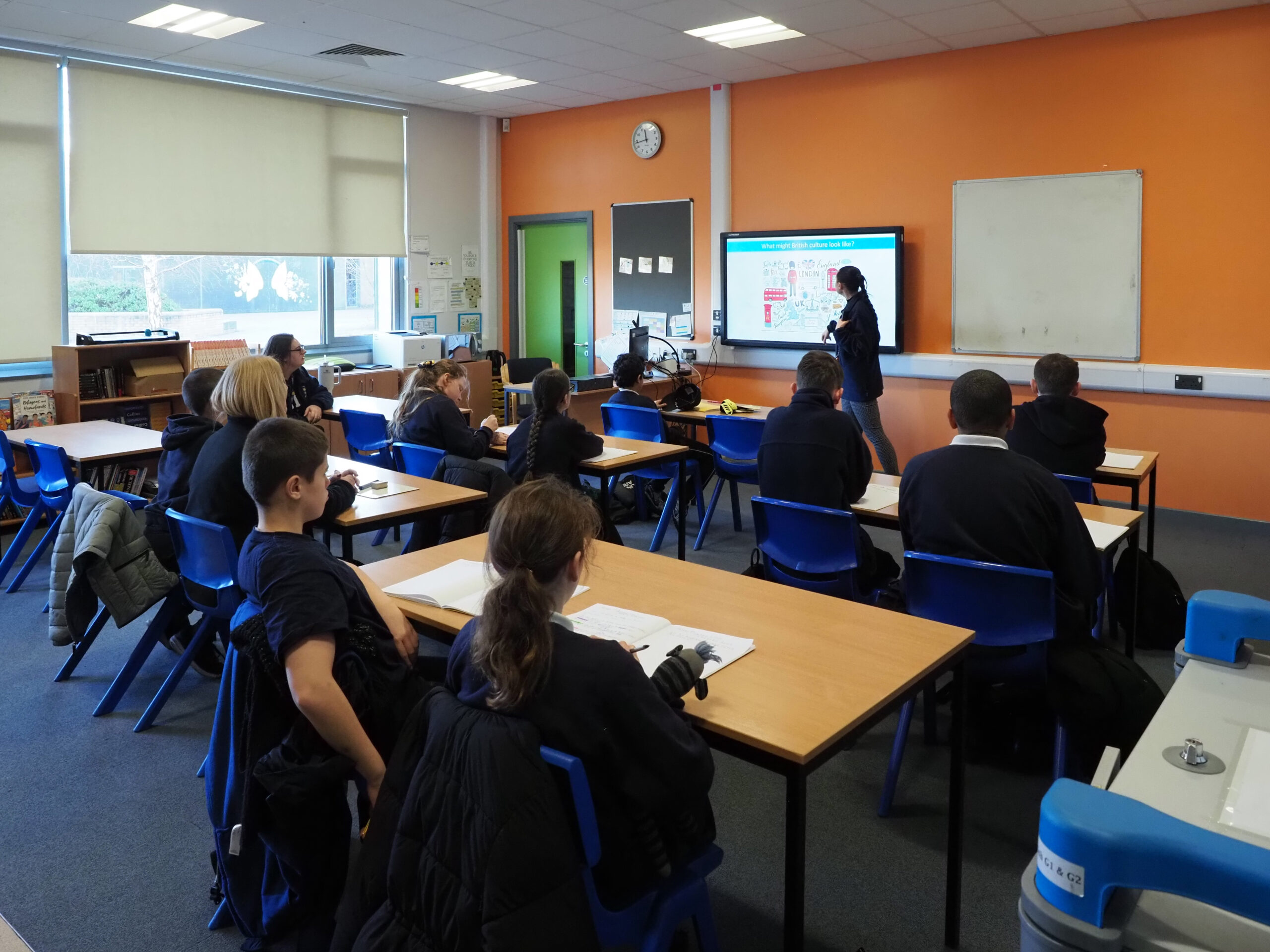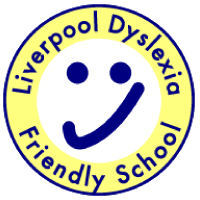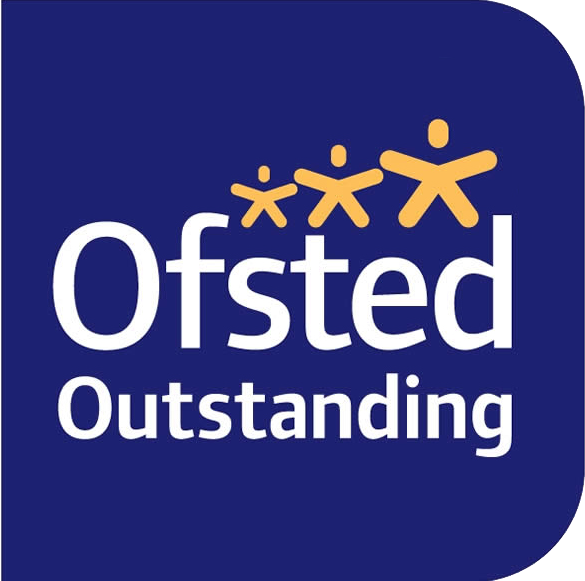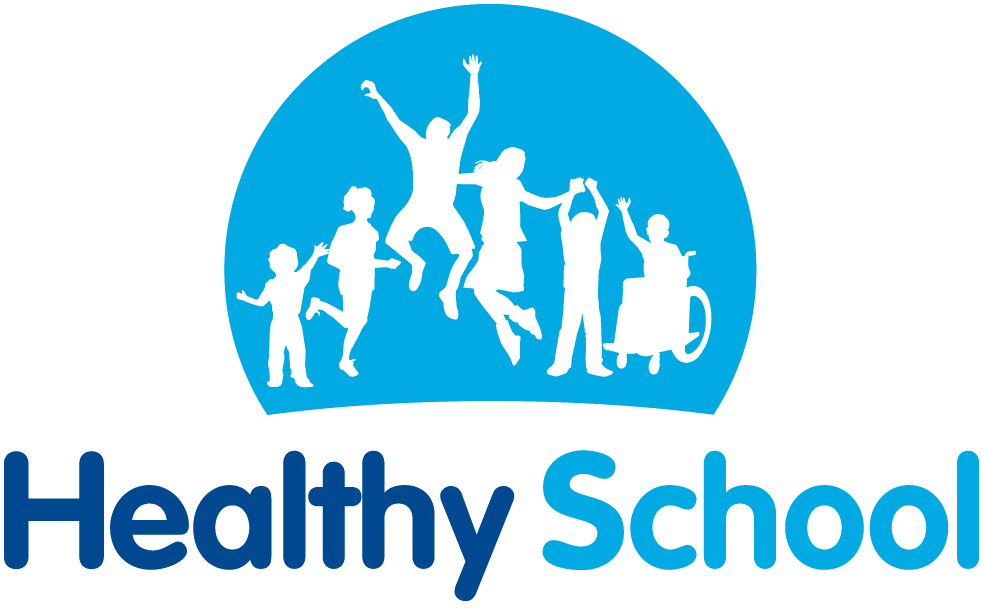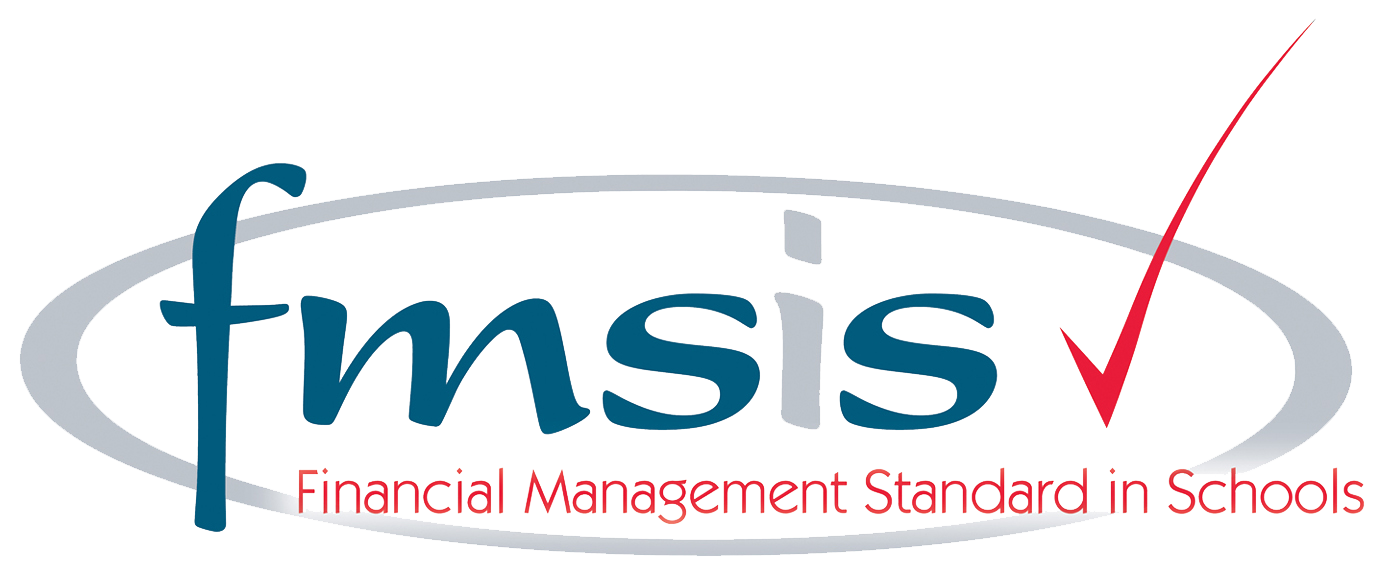What is Personal, Social, Health and Economic Education and Relationships and Sex Education?
Personal, social, health and economic (PSHE) education is an important and necessary part of all pupils’ education. All schools should teach PSHE, drawing on good practice, and this expectation is outlined in the introduction to the proposed new national curriculum.
PSHE is a non-statutory subject. To allow teachers the flexibility to deliver high-quality PSHE we consider it unnecessary to provide new standardised frameworks or programmes of study. PSHE can encompass many areas of study. Teachers are best placed to understand the needs of their pupils and do not need additional central prescription. RSE is mandatory.
INTENT:
PSHE education gives pupils the knowledge, skills, and attributes they need to keep themselves healthy and safe and to prepare them for life and work in modern Britain and include British Values. Personal Social Health Education (PSHE) including Relationships Sex Education (RSE) is at the heart of our school values and ethos and runs throughout all that we do.
PSHE education is a school curriculum subject through which pupils develop the knowledge, skills and attributes they need to keep themselves healthy, safe and prepared for life and work.
Our PSHE/ RSE curriculum aims to enable our children to become healthy, safe, independent, responsible members of society who demonstrate respect and tolerance and who are prepared to face and manage the challenges and opportunities of an ever-changing modern Britain.
We will:
- Help pupils to understand the importance of their physical and mental health, understand emotions and feelings and have strategies to help them become resilient and confident so that they are ready for the transition to their next stage of education or employment
- Help pupils to have a good understanding of themselves, to have empathy, an ability to work with others and to form and maintain positive relationships treating everyone equally with tolerance and respect.
- Teach our pupils’ age-appropriate understanding of healthy relationships through appropriate relationship and sex education.
- Teach our pupils about personal safety (online and off-line) and we will ensure pupils know where and how to get help if needed.
IMPLEMENTATION:
PSHE, incorporating RSE, ensures that all students have access to a broad and balanced curriculum which develops knowledge and skills over time. PSHE will be delivered thematically through carefully planned and adapted lessons. Following the PSHE Associations recommended programme of study (covers both mandatory and non-mandatory units) the content will be tailored to suit the needs of all at Bank View. The breadth of the programme supports learners’ knowledge and understanding of the wider world around them. Assessment is used at the start and end of topics. Pupils complete key questions at the start of a topic and again at the end to allow them to show progression and understanding of key concepts. Progression is mapped coherently. The progression allows for effective adaptation of the programme of study. Pupils have access to key terminology with vocab identified in lessons.
RSE is taught to all pupils unless parents choose to opt-out of the sex education element (see RSE policy). Relationships education is compulsory. Axcess to health (formerly Brook advisory service) deliver sessions and support a parents coffee morning annually.
The curriculum also includes many topical subjects as and when they arise, events and activities including charity fundraising, whole school celebrations, Health and Wellbeing, Fair Trade, Diversity week and Emergency First Aid training delivered by the British Red Cross annually. This alongside social opportunities such as supermarket visits, social activities and visits to local parks supports the enriched curriculum.
To achieve such an enriched curriculum the lessons may include, though not limited to the following activities:
- Individual, paired, small group and class-based learning.
- Paired, small group and class-based discussion, including speaking and listening practice.
- Reading, listening, and analysing a variety of religious texts
- Arts & Crafts based projects
- Experiments
- Quizzes
- Baking
- Students will have the opportunity to experience diversity through lessons and visitors
- To participate to spiritual events, such as yoga, meditation lessons
- Students will have the opportunity to use ICT in PSHE
- Visiting theatre companies
Developing Pupils’ Employability:
Children’s perceptions about careers are embedded from a young age so it is important to educate pupils about careers through PSHE lessons. PSHE education lessons give pupils insight into different career paths, while supporting them to understand and develop some of the skills and attributes needed, such as decision-making and goal setting. The content enables pupils to connect to the world of work, and reflect on their own interests, strengths and personal qualities. This includes off site visits to local employers.
IMPACT:
By the end of KS2 pupils will have covered topics under the domains of relationships, living in the wider world and health and wellbeing:
- Families and people who care for me
- caring friendships
- respectful relationship
- online relationships
- being safe
- mental wellbeing
- internet safety and harms
- physical health and fitness
- healthy eating
- drugs, alcohol and tobacco
- health and prevention
- basic first aid
- changing adolescent body
By the end of KS4 pupils will have covered topics under the domains of relationships, living in the wider world and health and wellbeing:
- families
- Respectful relationships, including friendships
- Online and media
- Being safe
- Intimate and sexual relationships, including sexual health
To conclude, the desired impact of PSHEE at Bank View is as follows:
PSHE education helps pupils to develop the knowledge, skills and attributes they need to thrive as individuals, family members and members of society. From making responsible decisions about alcohol to succeeding in their first job, PSHE education helps pupils to manage many of the most critical opportunities, challenges and responsibilities they will face growing up.
By teaching pupils to stay safe and healthy, and by building self-esteem, resilience and empathy, an effective PSHE/RSE programme can tackle barriers to learning, raise aspirations, and improve the life chances of the most vulnerable and disadvantaged pupils.
- To promote understanding of discrimination and respect and challenge prejudice and stereotyping.
- To promote the value of each student’s self-worth and thus help pupils to reflect on their uniqueness as human beings, share their feelings and emotions with others and appreciate the importance of forming and maintaining positive relationships.
- To promote spiritual, moral, social, and cultural development.
- To instil tolerance, empathy, and respect for others.
- To show an understanding of the world around them.
- To be able to read and understand a variety of texts and think about them critically.
- For students to confidently express their own opinions
- For students to reflect on their own opinions whilst developing a curiosity, appreciation and wonder about others
Assessment, Feedback and Interventions:
There are a number of reasons why it is important that learning in PSHE education is assessed. It is important for pupils to have opportunities to reflect on their learning, assessment also increases pupils’ motivation and improves learning as their raised awareness of their development illustrates the value of their learning. It is important for teachers to feel confident that learning has taken place, to be able to demonstrate progress, and to identify future learning needs. It also allows the leadership team, parents, governors and school inspectors to see the impact that PSHE education is having for pupils and for whole school outcomes, such as Ofsted judgements on personal development, behaviour and welfare, safeguarding, spiritual, moral, social and cultural (SMSC) development and the promotion of fundamental British values.
Assessing learning in PSHE education must use a combination of teacher assessment and pupil self- and peer assessment. The model of assessment that is most meaningful in PSHE education is ipsative assessment. Ipsative assessment compares where a pupil is at the end of a lesson or series of lessons against where they were before the lesson(s).
Assessment is completed in PSHE by all staff and by pupils. Start and end of topic assessment are used to measure progress. Regular formative assessment opportunities are carefully structured into lessons to inform pupil’s next steps and teacher planning.
We measure impact by the triangulation of lesson observations, work scrutiny and pupil voice, as well as this we have regular subject staff meetings. This allows staff to work together to develop the curriculum.
Regular feedback is given informally, verbally and thorough the marking and feedback policy. In addition, feedback is given via:
- Regular book scrutiny
- Termly assessment
- Target setting and strategies to meet any identified needs
- Pupils next steps
Intervention
Every term, PSHE staff assess pupils’ learning and record their progress, an intervention list is produced . The pupils on intervention’s progress is assessed every half-term and adjustments are made accordingly. Intervention may be academic, attendance, pastoral.
Supporting Pupils’ Memory Retention:
The PSHE programme of study follows a spiralised curriculum to ensures that key themes are regularly revisited to help students retain information. Recall/recap questions are utilised in lessons.
Key concepts in PSHE
Identity (their personal qualities, attitudes, skills, attributes and achievements and what influences these)
Relationships (including different types and in different settings)
A healthy (including physically, emotionally and socially) balanced lifestyle (including within relationships, work-life, exercise and rest, spending and saving and diet)
Risk (identification, assessment and how to manage risk rather than simply the avoidance of risk for self and others) and safety (including behaviour and strategies to employ in different settings)
Diversity and equality (in all its forms)
Rights (including the notion of universal human rights), responsibilities (including fairness and justice) and consent (in different contexts)
Change (as something to be managed) and resilience (the skills, strategies and ‘inner resources’ we can draw on when faced with challenging change or circumstance)
Power (how it is used and encountered in a variety of contexts including persuasion, bullying, negotiation and ‘win-win’ outcomes)
Career (including enterprise, employability and economic understanding)
Community (how we can be active member of the community. How can we make a positive impact in our communities)
PSHE/RSE Secondary Topics
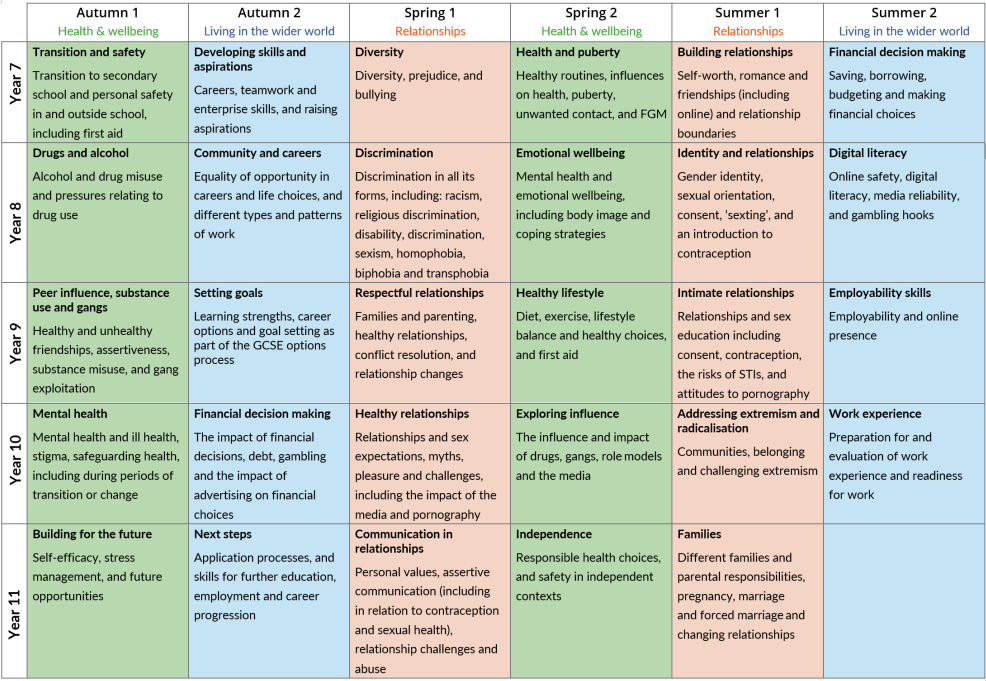
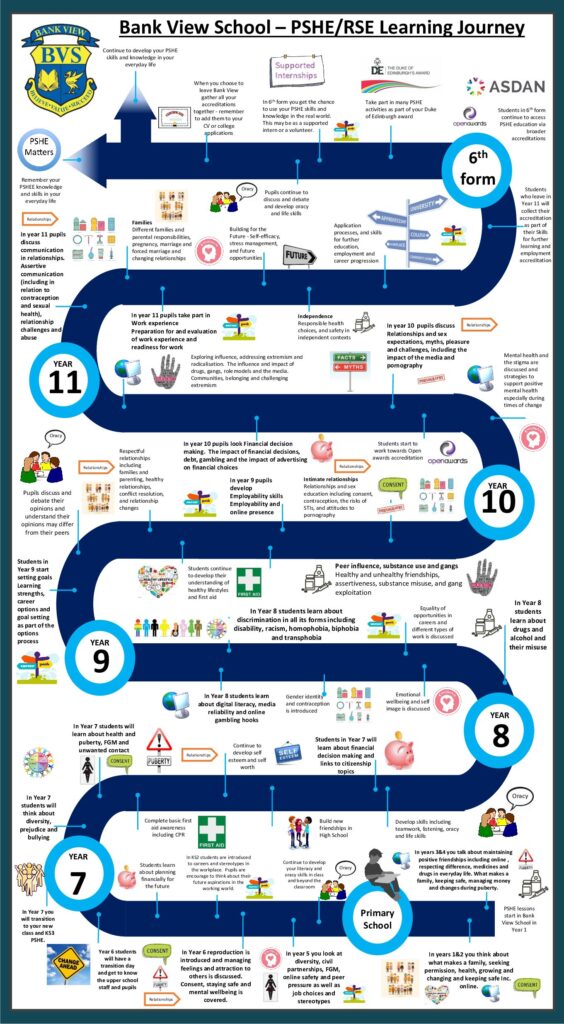
Relationships_Education__Relationships_and_Sex_Education__RSE__and_Health_Education
